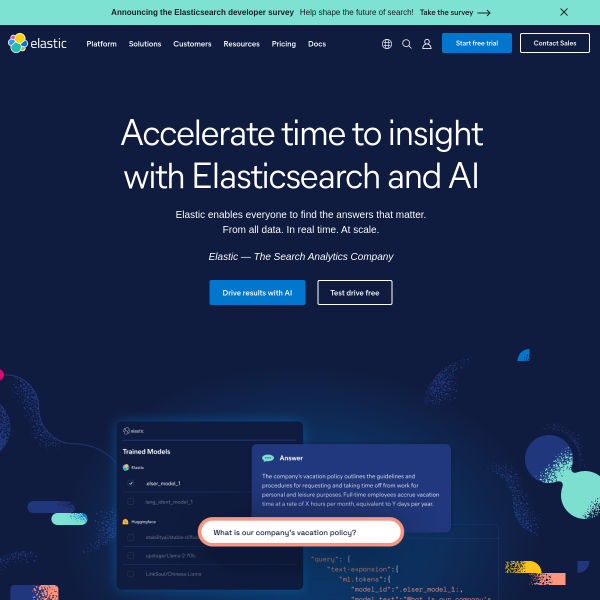About Elastic.co
Elastic is an open source search engine development platform that has become increasingly popular among enterprise companies looking for a powerful and versatile search and analytics solution. It was first released back in 2012, and is now the leading search engine development platform that provides businesses the ability to customize their searches for customers.
One of the major benefits of Elastic is that it is an open source platform, meaning that the source code is accessible to the public and can be easily modified and extended according to the user’s needs. Businesses are able to easily customize the search engine and analytics tools in order to meet their particular needs without the need for additional coding.
In addition, Elastic offers a number of key benefits which include scalability, low-cost of ownership, a wide range of algorithms and the ability to generate real-time analytics in mere minutes. Businesses can also use its cloud-based integration to index, search, and visualize data in the cloud, saving them time, money and resources.
Notably, however, Elastic has some drawbacks. Despite being open source, it is still a relatively new platform, and not all of its features are available on mobile devices. In addition, the learning curve may be a bit steep for those unfamiliar with the platform and lack of customer support may be a barrier to using Elastic.
The typical user of Elastic is a business owner or IT professional who needs access to powerful and versatile search and analytics tools. These users often have high technical knowledge and understanding of the platform as well as a wide range of programming skills.
Elastic is owned by Elastic NV, the company which started the open source project in 2012. Despite its open source platform, the firm has since been focused on providing high-quality search solutions to its customers while also pursuing further innovation.
In conclusion, for those looking for a powerful and versatile search and analytics platform that is open source, Elastic is an attractive option. Despite its drawbacks, the platform is regularly updated and provides businesses with a wide range of features to choose from. It is easy to customize and businesses have the ability to generate real-time analytics in mere minutes. For these reasons, businesses of all sizes can still benefit from using Elastic.
Alternatives to Elastic.co
Alternative solutions to Elastic.co include:
1. Apache Lucene/Solr: Apache Lucene/Solr is an open source search engine and platform that provides excellent full text search capabilities. Pros: Apache Lucene/Solr is a highly reliable open source alternative with good performance and scalability. It is easy to customize/extend. Cons: Difficult to setup. Requires expertise to maximize performance.
2. Splunk: Splunk is an enterprise-grade search-based platform for data analytics, security and operations. Pros: Splunk is highly scalable and provides real-time visibility across the organization. Easy for administrators to setup and use. Cons: Expensive. Limited customization options.
3. Apache SolrCloud: Apache SolrCloud is a distributed search engine from Apache. Pros: SolrCloud has built in fault tolerance, scalability and high availability features. No single point of failure. Easy to deploy. Cons: Resource intensive. Difficult to debug and maintain.
4. pg_search: pg_search is a full text search algorithm for PostgreSQL. Pros: Highly customizable. Good performance on large datasets. Easy to configure. Cons: Cannot be used for large-scale applications due to limited scalability. Limited queries and search options.
FAQ – Elastic.co
Q1. What is Elastic?
A1. Elastic is an open source search platform built on Lucene. It provides a distributed, multitenant-capable full-text search engine with an HTTP web interface and schema-free JSON documents.
Q2. What is the purpose of Elastic?
A2. The purpose of Elastic is to quickly and securely store, search, and analyze data in real time across multiple types of data stored in one centralized location.
Q3. What is Elasticsearch?
A3. Elasticsearch is a powerful open source search engine built on Apache Lucene and based on the RESTful web interface. It is used to index and search data in near real-time.
Q4. What type of applications can be built with Elasticsearch?
A4. Elasticsearch can be used to build applications that need fast, accurate, and powerful search capabilities. It can also be used to support mission-critical analytics and applications.
Q5. What type of databases does Elasticsearch support?
A5. Elasticsearch supports a variety of databases including SQL, NoSQL, graph, and documents, among others.
Q6. Does Elasticsearch support data streaming?
A6.Yes, Elasticsearch supports data streaming with its logstash product. Logstash is a server-side data processing pipeline that allows you to easily ingest data from multiple sources, transform it, and then send it to a data store.
Q7. Is Elasticsearch free to use?
A7.Yes, Elasticsearch can be freely used at any scale with no-cost subscriptions and open-source licenses.
Q8. How is Elasticsearch different from other search engines?
A8. Elasticsearch is built on top of Apache Lucene and is designed for quick, distributed search and analysis of large data sets. Elasticsearch is highly scalable, highly available, and provides powerful search capabilities.
Q9. What other products are available with Elastic?
A9. Other products include Kibana which is an analytics and visualization platform, Beats which is a collection of data shippers for forwarding data to Elasticsearch, and X-Pack, a security, monitoring, alerting, and management solution.
Q10. Is there an API for Elasticsearch?
A10.Yes, Elasticsearch has both a REST API and a Java API available for

Leave a Reply